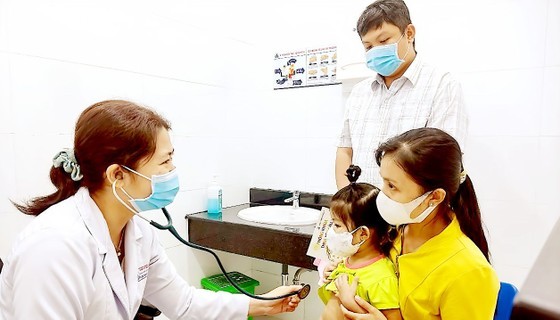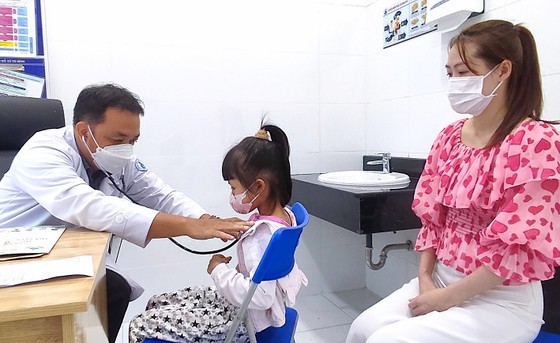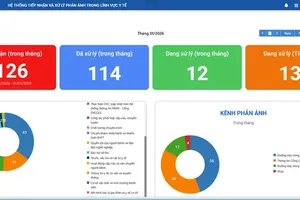 |
Level-2 Specialist Pham Thi Kieu Diem from Children Hospital No.1 is treating a child |
Hundreds of patients have visited HCMC Children Hospital No.1 these days, with a growth in the number of people suffering respiratory and hand-foot-mouth diseases. Level-2 Specialist Cao Minh Hiep from HCMC Children Hospital No.1 informed that since the beginning of this year, the hospital has treated tens of thousands of children with infectious diseases.
In particular, there have been over 3,000 cases of dengue fever, almost 20,000 cases of hand-foot-mouth disease, about 210,000 cases of influenza, (a rise of 60,000 patients compared to this time last year), and 38 hospitalized cases of atypical pneumonia caused by Mycoplasma. In addition, statistics of July and August reveal that outpatient respiratory examinations in HCMC Children Hospital No.2 nearly doubled to 7,000 cases.
The quantity of senior people suffering respiratory diseases is also on the rise. Each booth of the Respiratory Department in Thong Nhat Hospital (HCMC) normally treats 40-50 patients a day, but has lately served about 65-80 people per day. The number of respiratory inpatients in recent weeks has grown by 25-30 percent, falling to the cases with underlying diseases like asthma, chronic obstructive pulmonary disease, heart failure, and diabetes.
Data from the Ministry of Health show that since this January, over 68,000 cases of hand-foot-mouth disease have been reported nationwide, 18 of whom died. This is a rise of about 53 percent. Other diseases witnessing a growth are dengue fever and chickenpox.
 |
Level-2 Specialist Nguyen Hong Phong from Children Hospital No.1 is treating a child |
Deputy Director Nguyen Tran Nam of the HCMC Children Hospital informed that since this August, atypical pneumonia caused by Mycoplasma among children has risen with such symptoms as high fever, continuous coughing. Without proper treatment, the health conditions of a child might turn worse, leading to severe respiratory failure and possible death. The disease is spread through droplets and fluid containing the virus when a patient sneezes or coughs. There is now no vaccine for this disease yet.
Head Ngo The Hoang of the Respiratory Department in Thong Nhat Hospital shared that since elderly people normally have 4-5 chronic diseases, their health conditions get worse extremely quickly when they get respiratory infection.
Therefore, these people are advised to take a shower with warm water for a short time only, wear warm clothes after shower, limit the use of air conditioning, stay in ventilated rooms, and clean their mouth and teeth carefully before and after sleep. They should also follow nutritious diets with multi-vitamins from vegetables and fruits to boost their immune system. A regular injection of flu vaccine is a sensible act as well. More importantly, their relatives must not use old prescriptions or arbitrarily buy antibiotics when these senior people have high fever or cough.
Children are also advised to have vaccine injections to protect themselves from infectious diseases.
In related news, the Education and Training Department of Ba Ria-Vung Tau Province yesterday reported that since the opening ceremony of the new academic year, at least 14,500 cases of pink eye disease have been detected among educational institutes in the province, mostly in primary and junior high schools.
As a results, all educational institutes are asked to increase sanitation work while allowing infected students to stay home and study online. The Eye Hospital of Ba Ria-Vung Tau Province informed that for the last 7 days, the hospital has treated 80-100 cases of this disease per day, which a 10-time rise compared to normal time. 85 percent of those patients are students (many with complications due to improper self-treatment or slow detection of the disease).
























